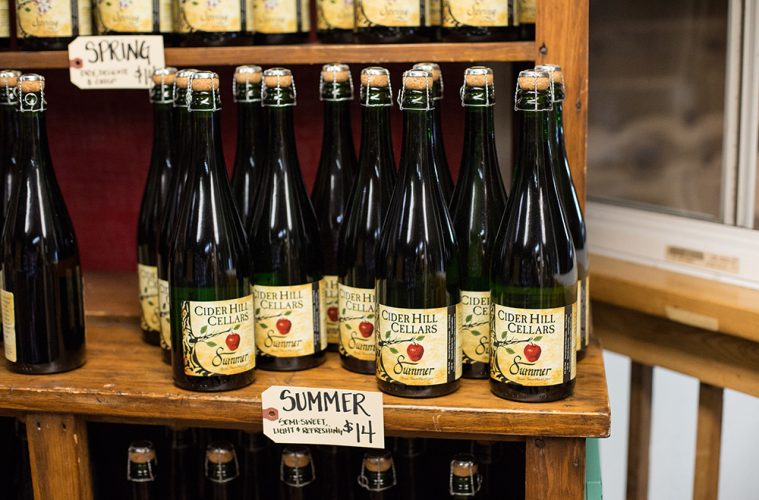The new cider production barn at Cider Hill Farm is the single largest investment the Cook family has made since buying the Amesbury farm back in 1978. At 2,500 square feet, with six shiny, brand-new fermentation tanks and a massive walk-in cooler for storing cider apples, it is an investment in the future in the truest sense of the expression.
“My dad puts more trust in me than I am comfortable with,” says Chadd Cook, founder and cider maker at Cider Hill Cellars, and 29-year-old son of Cider Hill’s owners Karen and Glenn Cook. “That corking machine cost as much as my new car—not even my first car,” he says, pointing to the machine that pounds the closure into each of his 750-milliliter bottles.
Founder and Cider Maker at Cider Hill Cellars, Chadd Cook
That trust appears to be well-founded. Since experimenting with making hard cider in college, Chadd has put in years studying fermentation, and his resume reads like a who’s who of area craft brewers, including RiverWalk Brewing Co. and Newburyport Brewing Company. Finally, his dad enticed him back to the farm with the purchase of a hundred trees specifically for hard cider.
“I didn’t consider or ruminate,” Chadd says. “I knew this was what I wanted to do…. What started out as a hobby had turned into an obsession.” So, two days after his father told him he’d bought out an entire nursery of cider trees, Chadd had pulled together a business plan with his father’s advice. “I’d always known I wanted to work for myself, and this ties in so well with our existing business. The synergy is terrific.”
Indeed, since Cider Hill Cellars’ launch this spring, it has sold out of several pressings, just through word of mouth. So far, most visitors happen upon the low-tech tasting bar while visiting the farm for pick-your-own apples or other fall fun. However, as word gets out, more first-time guests are being drawn to Cider Hill on the strength of the cider’s reputation.
“On a beautiful fall weekend, more than 1,000 people can show up at the farm,” Chadd says. That’s a lot of potential buyers, but the amount of hard cider available is limited. Chadd will only make cider from apples grown on the farm, and it takes about three years for a new planting to bear fruit. While the first cider trees his father planted can be harvested, the orchard has added 500 more trees, in heirloom varieties like Ashmead’s Kernel, Esopus Spitzenburg, and Yarlington Mill, that will be reaching maturity over the next few years, growing his current hard cider offerings from eight to ten.
There’s little chance those trees will end up on the pick-your-own map. Most cider apples are pretty much inedible, Chadd says, because making balanced hard cider requires fruits that are high in tannins and low in acid, to give the drink good body without being too sour.
Consumers used to commercial hard ciders will find two things surprising when tasting Cider Hill Cellars’ offerings: Except for the dessert cider, all have a very delicate flavor with subtle or no sweetness, and the carbonation barely perceptible.
“With too much carbonation, you can’t taste the cider,” Chadd says.
For fall, Cider Hill Cellars expected to have five ciders available– the beautifully delicate, bone-dry Spring cider and three semi-sweet varieties, including Raspberry Harvest, which smells and tastes like a handful of fresh raspberries—thanks to a whole pound of juiced raspberries in every bottle. Rounding out the mix is Winter, a viscous dessert cider made from frozen fruit—20 apples, to be precise, in every 375-milliliter bottle.
Chadd is excited about the opportunity to add his stamp to the family business. “It’s a blend of something I’m incredibly passionate about and my parents’ work,” he says. “I can’t imagine coming to Amesbury without Cider Hill. It’s a very special place.”
Cider Hill
45 Fern Ave., Amesbury
978-388-5525

